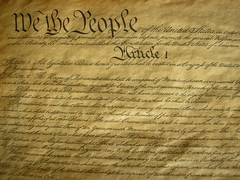| 224963803 | republic | A form of government in which citizens choose their leaders by voting. |  |
| 224963804 | Articles of Confederation | This document, the nation's first constitution, was adopted by the Second Continental Congress in 1781 during the Revolution. The document was limited because states held most of the power, and Congress lacked the power to tax, regulate trade, or control coinage. | |
| 224963805 | The Northwest Ordinance | This set up a government for the Northwest Territory, guaranteed basic rights to settlers, and outlawed slavery there. It also provided for the vast region to be divided into separate territories in the future. It provided a way to admit new states to the nation: once a territory had a population of 60,000 free settlers, it could ask Congress to be admitted as a new state. | |
| 224963806 | The Land Ordinance of 1785 | This set up a system for settling the Northwest Territory. Divided land into townships with with 36 sections (1 square mile each) and set aside land for public schools. | |
| 224963807 | Shay's Rebellion | This conflict in Massachusetts caused many to criticize the Articles of Confederation and admit the weak central government was not working; uprising led by Daniel Shays in an effort to prevent courts from foreclosing on the farms of those who could not pay the taxes. | |
| 224963808 | James Madison | A co-author of the Federalist Papers, he was an influential delegate of the Constitutional Convention later to be called the Father of the Constitution and the Bill of Rights. By writing the Bill of Rights, he secured the faith of those who were not sure about the Constitution. | |
| 224963809 | Constitutional Convention | The meeting of state delegates in 1787 in Philadelphia called to revise the Articles of Confederation. It instead designed a new plan of government, the US Constitution. |  |
| 224963810 | Virginia Plan | Virginia delegate James Madison's plan of government, in which states got a number of representatives in Congress based on their population. |  |
| 224963811 | New Jersey Plan | New Jersey delegate William Paterson's plan of government, in which states got an equal number of representatives in Congress |  |
| 224963812 | Great Compromise | the agreement by which Congress would have two houses, the Senate (where each state gets equal representation-two senators) and the House of Representatives (where representation is based on population). |  |
| 224963813 | Three-Fifths Compromise | Agreement that each slave counted as three-fifths of a person in determining representation in the House for representation and taxation purposes (negated by the 13th amendment) |  |
| 224963814 | federalism | A system of government in which power is shared between federal and state governments. |  |
| 224963815 | Federalists | Supporters of the Constitution that were led by Alexander Hamilton and John Adams. They firmly believed the national government should be strong. They didn't want the Bill of Rights because they felt citizens' rights were already well protected by the Constitution. |  |
| 224963816 | Antifederalists | People who opposed the Constitution. They thought it took too much power away from the states and did not guarantee rights for the people. |  |
| 224963817 | George Mason | He opposed the Constitution because it didn't protect individual rights. His opposition led to the inclusion of the Bill of Rights. |  |
| 224963818 | Bill of Rights | The first ten amendments of the U.S. Constitution, containing a list of individual rights and liberties, such as freedom of speech, religion, and the press. | |
| 224963819 | Ratification of the Constitution | Required 9 out of 13 states to ratify (approve) the Constitution before it became the law of the land. |  |
Chapter 8 Confederation to Constitution Flashcards
Primary tabs
Need Help?
We hope your visit has been a productive one. If you're having any problems, or would like to give some feedback, we'd love to hear from you.
For general help, questions, and suggestions, try our dedicated support forums.
If you need to contact the Course-Notes.Org web experience team, please use our contact form.
Need Notes?
While we strive to provide the most comprehensive notes for as many high school textbooks as possible, there are certainly going to be some that we miss. Drop us a note and let us know which textbooks you need. Be sure to include which edition of the textbook you are using! If we see enough demand, we'll do whatever we can to get those notes up on the site for you!

